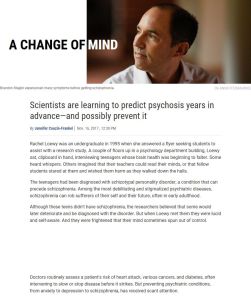Join getAbstract to access the summary!

Join getAbstract to access the summary!
Jennifer Couzin-Frankel
A Change of Mind
Scientists are Learning to Predict Psychosis Years in Advance – and Possibly Prevent it
Science, 2017
What's inside?
Psychiatrists are now trying to predict and prevent the most intractable mental illness – psychosis.
Recommendation
Early in her career, psychologist Rachel Loewy observed a disheartening contrast between two related populations. In interviews, teens with schizotypal personality disorder were “lucid and self-aware” enough to coherently describe their experiences. Middle-aged people with full-blown schizophrenia, however, could no longer have a normal conversation. If medical doctors attempt to predict and prevent diabetes, she wondered, shouldn’t psychologists do the same with schizophrenia? This article is an important resource for those interested in improving prognoses for psychiatric disease.
Summary
About the Author
Jennifer Couzin-Frankel covers biomedical and clinical research, scientific misconduct, and ethics for Science.























Comment on this summary